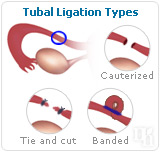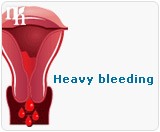
When women consider what birth control method they want to use one major factor they should consider is whether it is reversible or not. Women will be choosing a birth control because they want to delay pregnancy until later in life, or because they have chosen not to have any more children, or decided against them entirely. Tubal ligation is a permanent birth control method which makes women sexually sterile. The procedure results in the fallopian tube being cut, blocked, or tied.
Typically, the procedure doesn't or shouldn't affect a woman's hormone production because the process doesn't remove or interfere with the ovaries, but some unfortunate souls are subject to extreme hormonal imbalance. This is referred to as Postubal ligation syndrome, or PTS or PTLS. What causes this to happen and how do you know if you are suffering with it?
What Causes PTS?
Postubal ligation syndrome will vary from woman to woman and the reasons for it occurring will also depend on the individual. There are two main reasons why the production and regulation of hormones might be disturbed after tubal ligation has taken place.
The first, and more common reason, is that surgery has damaged the blood vessels that carry blood to the ovaries. This means that they can't function correctly and the production of estrogen and progesterone severely decreases or stops completely. This causes the onset of symptoms. The other reason why hormones might become imbalanced is because the tubal ligation surgery destroys or damages the receptor cells that send information. If this happens the ovaries are still producing the hormones, but the messages being sent to the rest of the body's system is imbalanced or incorrect.
What Are the Symptoms of PTS?

Many of the symptoms are similar to those that are experienced during menopause because the hormone imbalance is similar. Some symptoms are experienced because the production of estrogen and progesterone has diminished, and some people will experience symptoms because the surgery has damaged just progesterone production which can result in estrogen dominance. The symptoms associated with PTS are:
- Ectopic pregnancy (if it hasn't worked correctly)
- Change of color in vaginal area
- Abnormal or pelvic discomfort or pain, particularly at time of ovulation Prolapsed uterus
Recommendation
If you think you are suffering with PTS then it is important you pay a visit to your doctor. There are various ways to treat hormonal imbalance but these should be advised by someone who can evaluate your own health and your own circumstances. Reversal of the tubal ligation procedure is also an option but the side effects of this need to be seriously assessed before deciding to go back into surgery. To find out more about hormonal imbalance follow the link below.


